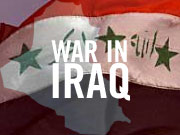Audio
Photos
Your Voice
| |||||||||||||||||||||||||||||||||||
Bush: Hussein is a torturer and killer but will get a fair trial
December 15, 2003
Washington, D.C. — President Bush promised a fair, public trial for Saddam Hussein on Monday but also said "he's a torturer and a killer" and can't be trusted to tell interrogators the truth about weapons of mass destruction or attacks against Americans in Iraq.
Asked if Saddam should face the death penalty, Bush said, "I have my personal views. And this is a brutal dictator."
"He's a person who killed a lot of people. But my views, my personal views, aren't important in this matter," the president said.
Two days after Saddam's capture in a farmhouse burrow, Bush held a year-end news conference and delivered his own verdict on the deposed Iraqi leader, whom the administration blames for hundreds of thousands of mass executions:
 | |||
"Good riddance. The world is better off without you, Mr. Saddam Hussein."
Heading into a battle for re-election, Bush protested that it was too early to talk about the campaign now. "Forget politics," Bush said. But in what sounded like a political pitch, he went on to say he was pursuing a strategy "to keep the country more secure but more prosperous and a better country, as well."
He said Democratic presidential candidate Howard Dean had made an "absurd insinuation" to raise questions about whether the president had advance knowledge of the Sept. 11 attacks.
Though Dean has mentioned such speculation, he said last week that he did not believe it to be true.
As for Saddam, Bush declined to say where or when or how he would be tried. The president made no commitment to turn him over unconditionally to Iraq, which established a special tribunal last week to try top members of Saddam's government for genocide, war crimes and crimes against humanity.
"The Iraqi citizens need to be very much involved in the development of a system that brings him to justice," Bush said. "And there needs to be a public trial, and all the atrocities need to come out, and justice needs to be delivered. And I'm confident it will be done in a fair way."
He said he would let the legal community decide whether the charges against Saddam should include his 1990 invasion of Kuwait or his alleged assassination plot against Bush's father.
The State Department said the Iraqi tribunal plan provides a role for international advisers, judges, prosecutors and other members of the court. Pierre-Richard Prosper, the U.S. ambassador-at-large for war crimes issues, will go to Baghdad early next year to work with Iraqis on establishing the court, said Richard Boucher, the State Department spokesman.
Questions about Saddam dominated Bush's 48-minute news conference. And the president took the opportunity - repeatedly - to build an indictment against Saddam as a murderous tyrant who could not be trusted to clear up questions about whether Iraq had weapons of mass destruction or whether Saddam had ties to terrorist groups.
"I mean, he's a deceiver, he's a liar, he's a torturer, he's a murderer," Bush said.
He said Saddam had been willing "to destroy his country and to kill a lot of his fellow citizens" and used weapons of mass destruction against people in his own country. "He is the kind of person that is untrustworthy and I'd be very cautious about relying upon his word in any way, shape or form."
Bush spoke as former Secretary of State James A. Baker III prepared for an overseas trip in search of promises to ease Iraq's burden of foreign debt. Starting in Paris, Baker will visit France, Germany, Italy, Britain and Russia.
Bush readily acknowledged sharp differences with allies, saying, "What you're talking about is France and Germany, truth be known." But he sought to limit the boundaries of the dispute to opposition to the U.S.-led war rather than issues such as France's and Germany's refusal to contribute troops or money for Iraq's reconstruction, or their anger at being excluded from rebuilding contracts.
"So I don't agree that this is a dividing line," the president said. "I think this is a disagreement on this particular issue."
Bush said Saddam's capture should reassure Iraqis that the former president will not return to power. He described some Iraqis as "fence-sitters," staying on the sidelines as Iraq moved toward democracy. Saddam "can no longer provide any excuse for some who were afraid to act," Bush said.
Nevertheless, he said there will be more violence from Saddam loyalists and foreign terrorists "that cannot stand the thought of a free Iraq emerging in the Middle East."
Bush passed up an opportunity to say whether Saddam's fate held any lessons for North Korean leader Kim Jong Il and U.S. demands that Kim abandon a nuclear weapons program. Bush said that military force was a last resort and that he was using diplomatic means and persuasion now with North Korea.
"I'm pleased with the progress we're making," Bush said, "and I hope, of course, he listens."
(Copyright 2003 by The Associated Press. All Rights Reserved.)
|
News Headlines
|
Related Subjects
|


